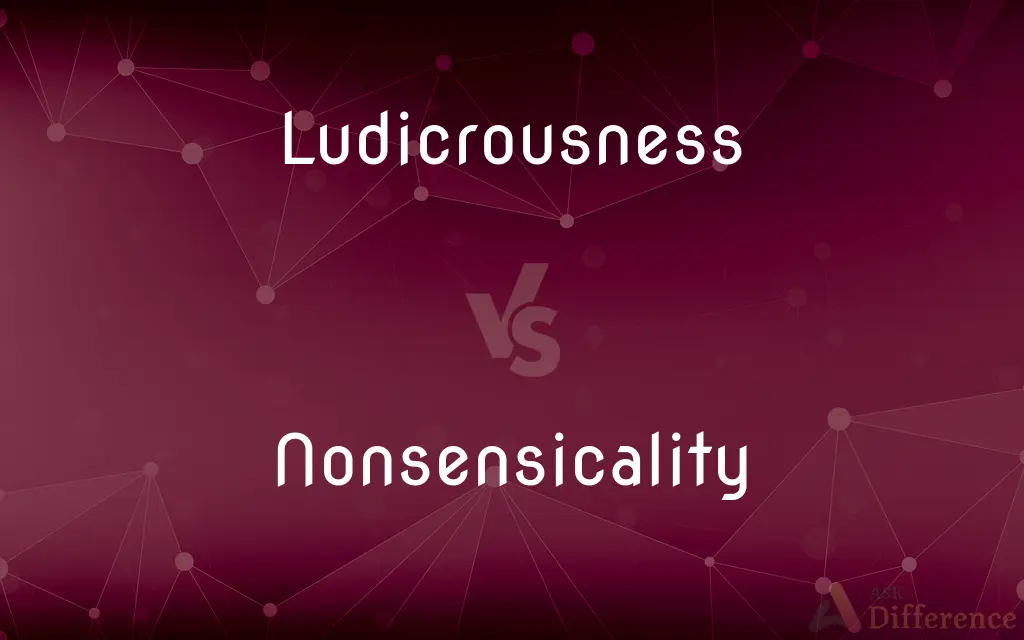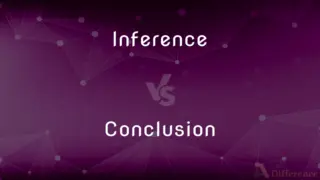Ludicrousness vs. Nonsensicality — What's the Difference?
By Tayyaba Rehman — Published on October 7, 2023
"Ludicrousness" refers to the quality of being laughably absurd or ridiculous. "Nonsensicality" denotes the lack of meaningfulness or coherence. Both imply deviation from the norm but vary in the nature of the deviation.

Difference Between Ludicrousness and Nonsensicality
Table of Contents
ADVERTISEMENT
Key Differences
Ludicrousness" emanates from situations, statements, or behaviors that are so absurd or out of place that they might invoke laughter. This term highlights the comedic or laughable aspect of something. On the other hand, "Nonsensicality" stems from things that lack sense, logic, or clear meaning. It speaks more to incoherence than to humor.
In daily life, we might encounter something of such extreme silliness or ridiculousness that we label it with "ludicrousness." For instance, wearing winter clothing on a hot summer day might be seen as ludicrous. Meanwhile, "nonsensicality" would pertain to statements or actions that don't follow any logic, like a jumbled collection of words presented as a sentence.
It's worth noting that "ludicrousness" often carries a more judgmental tone, implying that something is so out of the ordinary that it's comically absurd. "Nonsensicality," while also denoting deviation from the ordinary, leans more towards highlighting the lack of clear meaning or coherence in something, without necessarily invoking humor.
In essence, while both "ludicrousness" and "nonsensicality" address abnormalities, the former is more about laughable absurdity, and the latter about the absence of sense or logic.
Comparison Chart
Primary Meaning
Quality of being laughably absurd
Lack of meaningfulness or coherence
ADVERTISEMENT
Tone
Often judgmental and comedic
Neutral, pointing to incoherence
Usage
Refers to out-of-place or silly situations
Refers to incoherent or meaningless situations
Examples
Wearing winter clothes in summer
A jumbled collection of words in a sentence
Implication
Implies deviation with a comedic twist
Implies deviation due to lack of sense
Compare with Definitions
Ludicrousness
The state of being laughably or obviously absurd.
The ludicrousness of his argument made everyone chuckle.
Nonsensicality
The state of being without clear meaning or logic.
The nonsensicality of the statement left everyone confused.
Ludicrousness
Something that stands out due to its comedic abnormality.
The costume's ludicrousness made it the hit of the party.
Nonsensicality
A lack of coherence or rationality.
The theory was full of contradictions and nonsensicality.
Ludicrousness
Being so out of place as to be comedic.
The ludicrousness of a penguin in the desert is undeniable.
Nonsensicality
Something that doesn't adhere to common sense.
The instructions were filled with nonsensicality.
Ludicrousness
An extreme deviation from the expected norm.
The ludicrousness of the situation caught everyone off-guard.
Nonsensicality
Being devoid of understandable or clear purpose.
The artwork's nonsensicality was its main appeal to some.
Ludicrousness
The quality of being worthy of mockery due to absurdity.
He realized the ludicrousness of his mistake.
Nonsensicality
Statements or behaviors that lack a clear logical structure.
Many avant-garde poems embrace nonsensicality.
Ludicrousness
So absurd or incongruous as to be laughable.
Nonsensicality
Lacking intelligible meaning
A nonsensical jumble of words.
Ludicrousness
The state or quality of being ludicrous.
Nonsensicality
Foolish; absurd
Nonsensical ideas.
Nonsensicality
(uncountable) The state or condition of being nonsensical.
Nonsensicality
(countable) A nonsensical belief, remark, etc.
Nonsensicality
A message that seems to convey no meaning
Common Curiosities
Is "ludicrousness" always funny?
Not necessarily, but it often carries a comedic or absurd connotation.
Are nonsensical statements always without meaning?
They lack clear or logical meaning but may have artistic or emotional significance.
Is "ludicrousness" more subjective than "nonsensicality"?
It can be, as what one finds absurd or laughable might vary.
Can something be both ludicrous and nonsensical?
Yes, something can be laughably absurd and lack meaning simultaneously.
Is "ludicrousness" the same as "silliness"?
They're similar, but "ludicrousness" often implies a stronger degree of absurdity.
Do comedians often use "nonsensicality" in their routines?
Some do, employing incoherent or absurd elements for comedic effect.
Does "nonsensicality" mean something is illogical?
Yes, it implies a lack of logic or coherence.
Can "ludicrousness" be used in a positive sense?
It's typically neutral or negative, but in some contexts, it might highlight quirky charm.
Is all modern art filled with "nonsensicality"?
Not all. While some modern art challenges traditional norms, it doesn't mean it's devoid of meaning.
Can a logical argument have elements of "ludicrousness"?
It's possible if an argument, while logical, presents absurd or laughable premises.
Share Your Discovery

Previous Comparison
Engraving vs. Stylet
Next Comparison
Inference vs. ConclusionAuthor Spotlight
Written by
Tayyaba RehmanTayyaba Rehman is a distinguished writer, currently serving as a primary contributor to askdifference.com. As a researcher in semantics and etymology, Tayyaba's passion for the complexity of languages and their distinctions has found a perfect home on the platform. Tayyaba delves into the intricacies of language, distinguishing between commonly confused words and phrases, thereby providing clarity for readers worldwide.
















































